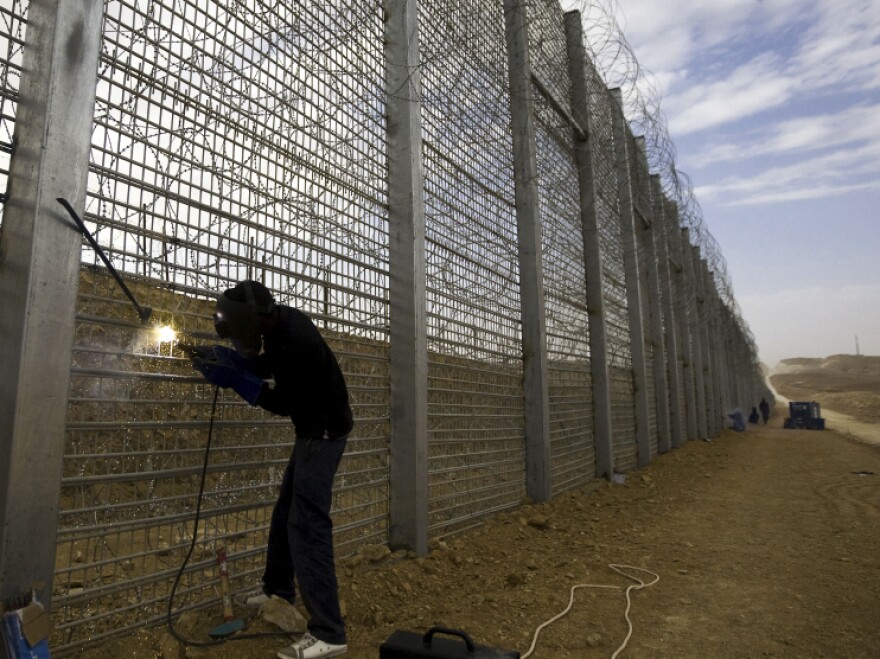The place is Tel Aviv, but it doesn't look at all like Israel: Dozens of African men are sitting on broken stools and plastic at a makeshift restaurant.
Sudanese fare is on the menu. The men scoop up the stews and salads that remind them of home.
Abdullah Mohammad Mustafa started this restaurant with a couple of other African men who arrived in Israel five years ago from Sudan's troubled Darfur region. They are among some 40,000 Africans who have come to Israel illegally, and many have congregated in neighborhoods in Tel Aviv.
Mustafa says he hoped the business would be part of a new life, but now Israel is moving against them, and he's giving up on that dream. "For me, I think this is the last year in Israel," he says. "We tried to make a business and we failed. So we cannot spend the rest of our life here. We cannot waste our time for nothing. This year most of the people will leave Israel."
Mustafa is among the many Africans and Asians who have been arriving in Israel in recent years, and most have been sneaking across the country's porous southern border with Egypt.
Like many other countries in the world, Israel faces a serious problem with illegal immigration. Israel always has to find the most humane way of dealing with this tricky issue.
Israel Plans Several Measures
Israel is now taking a series of steps to stop the influx and reverse the flow. This summer, Israel will begin deporting those who agree to leave voluntarily. Other parts of the plan are still under construction — like a 150-mile fence being built along the border with Egypt. And there will also be a massive detention center.
"Like many other countries in the world, Israel faces a serious problem with illegal immigration," says Josh Hantman, a spokesman for Israel's Defense Ministry. "Israel always has to find the most humane way of dealing with this tricky issue."
He says the detention center, which will be completed later this year, will have spacious rooms, computers and a sports center. Detainees will have access to lawyers and health care.
By the end of this year, Israeli officials say, the facility will be able to hold several thousand people. By the time it is fully built, it will have a total capacity of 11,000 people — making it one of the largest detention facilities in the world.
Human-Rights Group Objects
Physicians for Human Rights, a private group that works closely with the African community in Israel, is often the first stop for new immigrants. It has extensive files documenting the torture and violence that many immigrants faced in other countries before reaching Israel.
"We see from other countries that the effect of detention centers on asylum seekers that went through trauma in their home countries, or on their way to Israel, will be very harmful for their health, both mental and physically," says Shachar Shoham, the director of the Migrants Department at Physicians for Human Rights.
Shoham says Israel already has a policy of detaining some of the people who enter the country without permission. Up until now, they've been sent to Ketziot, a sprawling prison in southern Israel.

The site of the new detention center is adjacent to Ketziot. Shoham says she fears it will become an extension of the prison, rather than a separate facility.
Mustafa knows Ketziot all too well. He was kept there for over a year, without being told the charges against him, he says, or having access to a lawyer.
He says he nearly went crazy there, not knowing what would happen to him.
Many African immigrants are young people "and they are looking for their future. If you put them in a detention center it will drive them crazy," Mustafa says.
Seeking Another Destination
At age 35, Mustafa says he already feels old. It's been nearly 10 years since he left Darfur, and Israel is the third place he has sought asylum.
"We cannot ever go back [to Darfur], but we will try to see another place like Kenya or Uganda," Mustafa says.
This week, he joined hundreds of people protesting Israel's decision to begin deporting some Africans. None of us, he says, are really going home.
Copyright 2020 NPR. To see more, visit https://www.npr.org.


